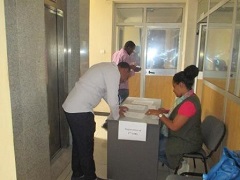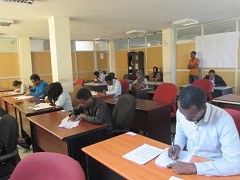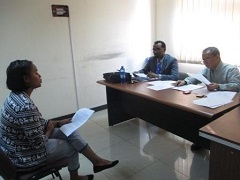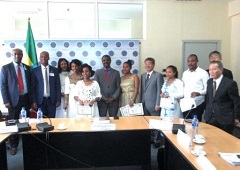Project News
2018-12-03
"CARS" Running on the Qualified Roadway of KAIZEN
When you hear "CARS", you simply think of a vehicle. But, "CARS" is being associated with another meaning in Ethiopia. CARS, for Kaizen consultants, means the Kaizen consultant certification system. The name comes from the first letters of the Certification, Accreditation and Registration System: CARS. This system was established by the Ethiopian Kaizen Institute (EKI) and the JICA Kaizen Project in May 2017.
CARS is not only the registration system of Kaizen consultants. It has four important objectives:
- To ensure the quality of Kaizen service to the clients = Quality assurance
- To improve consulting skills and technology = Technology improvement
- To provide a standard for fostering and evaluating consultants = Standard provision
- To show consultants a roadmap towards self-enlightenment = Self-enlightenment function
CARS is one of the important mechanisms for promoting the dissemination of Kaizen nationwide. In the system, there are five levels according to the degree of difficulty of the kaizen method, namely Kaizen Starter (KS), Basic Consultant (BC), Intermediate Consultant (IC), Advanced Consultant (AC) and Principal Consultant (PC). Among the five, four levels from BC to PC are required to qualify as a consultant. While the Japanese "Registered Management Consultant for Small and Medium Enterprises" is a gateway towards becoming a consultant, the CARS certification is granted to personnel who can become immediate human resource assets for the dissemination of Kaizen. Thus, CARS values practical experience both as a requirement for sitting for the exam and as the criteria of passing or failing.
From October to November 2018, the second CARS examination was conducted for the BC and IC levels. The exam consists of a written test, oral test and an overall evaluation. This year saw an increase in applicants from different organizations in addition to EKI, such as City/Regional Kaizen Institutes (C/RKIs), industrial technology institutes, and private enterprises. A total of 53 people who met the requirements for the exam took the written test. Those who passed proceeded to the oral test, and then underwent the overall evaluation where business experience is assessed. Eventually, six and four consultants were qualified for the BC and IC levels, respectively. They received the Kaizen consultant certifications from H.E. Mr. Bezabih Gebreyes, Civil Service Commissioner and H.E. Mr. Daisuke Matsunaga, Japan's Ambassador to Ethiopia, on the occasion of the 5th Joint Coordinating Committee Meeting of the Project held on November 30, 2018.
 Registration of 2nd CARS exam
Registration of 2nd CARS exam
 Paper Test
Paper Test
In the first CARS exam conducted last year, 8 and 11 consultants were certified as BCs and ICs, respectively. Together with the second CARS, a total of 29 consultants passed through the narrow gate of the system.
Applicants for the first CARS exam were only from the EKI and C/RKIs. However, 13 candidates from the private sector sat for the exam in the second CARS. Due to the 40% increase of applicants in the second year, the exam was conducted in two cities.
The goal is for Kaizen dissemination to be accelerated through the "CARS" system and to eventually have CARS recognized as the national certification system of Ethiopia.
 Oral Test
Oral Test
 The CARS Certification Awarding Ceremony
The CARS Certification Awarding Ceremony
(in the 5th Joint Coordinatiing Committee meeting)
- About JICA
- News & Features
- Countries & Regions
- Our Work
- Thematic Issues
- Types of Assistance
- Partnerships with Other Development Partners
- Climate Change / Environmental and Social Considerations
- Evaluations
- Compliance and Anti-corruption
- Science and Technology Cooperation on Global Issues
- Research
- JICA Development Studies Program / JICA Chair
- Support for the Acceptance of Foreign HRs / Multicultural and Inclusive Community
- Publications
- Investor Relations
